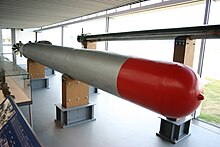The Type 95 torpedo was a torpedo used by submarines of the Imperial Japanese Navy during World War II.
| Type 95 torpedo | |
|---|---|
 Type 95 torpedo display at Yamato Museum. | |
| Place of origin | Japan |
| Production history | |
| Designed | 1935 |
| Specifications | |
| Mass |
|
| Length | 281 inches (7.1 m) |
| Warhead weight |
|
The Type 95 was based on the Type 93 torpedo (Long Lance[1]); its mod 1 had a smaller 405 kg (893 lb) and mod 2 had a larger 550 kg (1,210 lb) warhead size than the Type 93's 490 kg (1,080 lb). The Type 95 was similar to the U.S. Navy's contemporary Mark 16 hydrogen peroxide torpedo, which had a shorter range, slightly higher top speed and a larger and nearly twice as powerful warhead at 580 Kilograms filled with TORPEX or HBX/HBX-3 Explosive. It was intended to be fired from a standard 533 mm (21.0 in) torpedo tube of a submerged submarine.
Range of the Type 95 was (for the mod 1) 9,000 m (9,800 yd) at 49–51 kn (91–94 km/h; 56–59 mph), or 12,000 m (13,000 yd) at 45–47 kn (83–87 km/h; 52–54 mph),[2][3] which was about three times the range of the U.S. Navy Mark 14 at the same speed when using longer range and 45 to 47 knots.
The Type 95 was the fastest torpedo in common use by any navy during World War II. Its warhead size was the largest of any submarine torpedo, and second only to the Type 93 used by Japanese surface ships. Its engine was a kerosene-oxygen wet-heater rather than the compressed air used by most torpedo types at the time.
References
edit- ^ Boyne p. 127, 254
- ^ Mark Stille, Tony Bryan (2007). Imperial Japanese Navy Submarines 1941-45. Osprey. p. 7. ISBN 9781846030901.
- ^ "Japanese WW2 torpedoes". Retrieved 17 September 2010.
Bibliography
edit- Boyne, Walter J. Clash of Titans. 1995, Simon and Schuster. ISBN 0-684-80196-5.